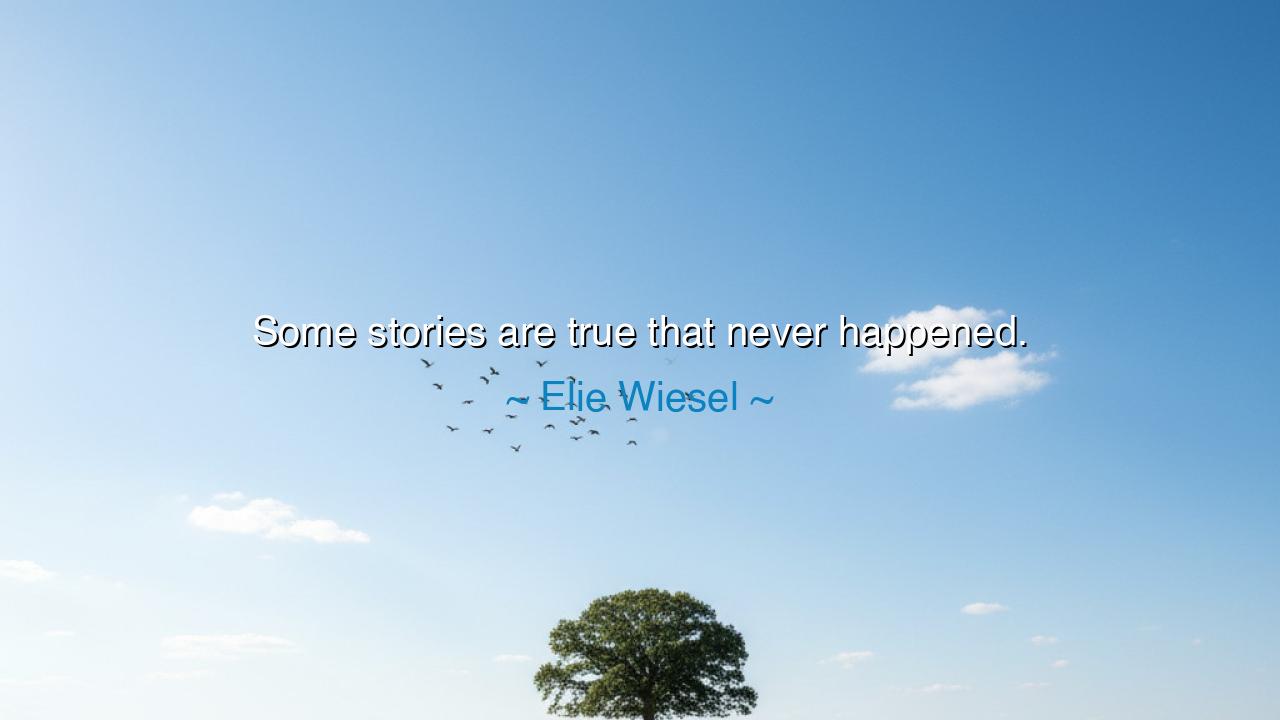
Some stories are true that never happened.






The great writer and witness of the human soul, Elie Wiesel, once said: “Some stories are true that never happened.” These words come not from a place of fantasy, but from a deep understanding of truth itself—the truth that goes beyond facts, beyond history, beyond the record of events. Wiesel, who endured the unspeakable horrors of the Holocaust and devoted his life to ensuring that the world would never forget, understood that not all truth is bound to time and space. Some truths live in the realm of the spirit—they dwell in the heart, in memory, in myth, in the imagination of a people struggling to give shape to their suffering and their hope. To say that “some stories are true that never happened” is to remind us that there exists a kind of truth that does not depend upon evidence but upon meaning.
For the ancients knew this well. The stories they told—the myths of gods, heroes, and creation—were not historical records, yet they carried truths deeper than mere chronology could hold. When they spoke of Prometheus stealing fire from heaven, they were not describing an event in the sky, but the eternal struggle of mankind to bring light into the darkness. When they told of the phoenix rising from ashes, they were speaking not of a bird, but of the indomitable spirit of rebirth within every human heart. So too did Wiesel, though living in the modern age, stand among these storytellers of the soul. His words remind us that truth can wear many garments—sometimes the robe of fact, sometimes the cloak of metaphor—and both are sacred.
Wiesel himself knew the power of story to hold what cannot be spoken. After surviving the death camps, he found that the language of facts was too frail to carry the weight of horror. Numbers and names could not convey the loss of humanity, the burning of souls, the silence of God. And so, through story, he sought a way to express the truth of suffering—a truth that no document could contain. His tales, though not always literal, were born from the ashes of reality. They were true because they captured the inner experience of pain, hope, faith, and despair. They spoke for millions whose voices had been erased. Thus, the stories that never happened became truer than history itself.
Consider the example of Anne Frank, whose diary became the voice of countless children lost to war. Her words tell of fear, courage, and the yearning for light in darkness. Though her life was cut short, the world remembers not only her reality, but the truth she represents—the innocence of all who suffer under oppression. Her story has taken on a symbolic life beyond its literal details; it has become a universal parable of endurance and faith in humanity. In this way, her story, like Wiesel’s saying, reveals that truth is not confined to what happened once—but to what keeps happening in every human heart that refuses to surrender to despair.
But we must not mistake story for deception. Wiesel did not speak of falsehood; he spoke of the deeper dimension of meaning. A lie seeks to conceal the truth; a story seeks to reveal it. When the poet invents, when the teacher tells a parable, when the artist paints what no eye has seen, they are not deceiving—they are unveiling. They are reaching into the unseen world of emotion and spirit and bringing forth what facts alone cannot touch. The philosopher may describe the world as it is, but the storyteller shows us what it feels like to be human within it. Both are needed, but it is the story that moves the heart—and through the heart, awakens wisdom.
And so, Wiesel’s words are a lesson to every seeker of truth. Do not measure truth only by facts, for the facts of a life may be small, but its meaning may be vast. A dream may contain more wisdom than a chronicle, a fable more honesty than a report. When you hear a story, ask not, “Did this happen?” but rather, “What does this reveal?” For it is through the imagined that the eternal often speaks. This is why scripture, poetry, and legend endure—they tell us not what was, but what is and what always will be.
Therefore, my listener, learn to cherish the stories that never happened, for within them lie the hidden foundations of the human spirit. Tell your own stories, not only of what you have seen, but of what you have understood. Use your imagination as a bridge between experience and meaning. When you speak truthfully, even your fictions will carry truth; when you speak without heart, even your facts will ring hollow. Remember always Wiesel’s gift to us: that the greatest truths are not bound to history, but live forever in the timeless kingdom of the human soul.






AAdministratorAdministrator
Welcome, honored guests. Please leave a comment, we will respond soon